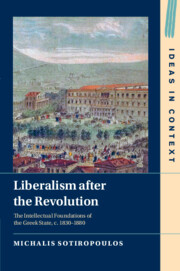Book contents
- Liberalism after the Revolution
- Ideas In Context
- Liberalism after the Revolution
- Copyright page
- Contents
- Acknowledgements
- Note on Transliteration
- Abbreviations
- Introduction
- Chapter 1 Mind the Legal Gap
- Chapter 2 ‘Romanist’ Jurisprudence
- Chapter 3 ‘It’s More Than Economics, Stupid’
- Chapter 4 ‘Let’s Talk about the Nation and the State’
- Chapter 5 The Law of Nations, Sovereignty and the International Autonomy of the Greek State
- Chapter 6 Ideas into Practice
- Conclusion
- Bibliography
- Index
Chapter 1 - Mind the Legal Gap
The Polizeistaat, ‘Enlightened Reforms’ and Their Liberal Critics (1832–1844)
Published online by Cambridge University Press: 01 December 2022
- Liberalism after the Revolution
- Ideas In Context
- Liberalism after the Revolution
- Copyright page
- Contents
- Acknowledgements
- Note on Transliteration
- Abbreviations
- Introduction
- Chapter 1 Mind the Legal Gap
- Chapter 2 ‘Romanist’ Jurisprudence
- Chapter 3 ‘It’s More Than Economics, Stupid’
- Chapter 4 ‘Let’s Talk about the Nation and the State’
- Chapter 5 The Law of Nations, Sovereignty and the International Autonomy of the Greek State
- Chapter 6 Ideas into Practice
- Conclusion
- Bibliography
- Index
Summary
The chapter explores the state-building process that the Bavarian-led monarchy put into effect in Greece from 1832 onwards by agreement with the guarantor powers of Greek independence (Britain, France and Russia). By concentrating on the structures of power and the ideas that informed their formation – the Polizeiwissenschaft, the theory or technology of the police state and the administrative techniques of cameralism – the chapter situates the Greek case within a Europe-wide process of ‘Enlightened reforms’ from above. In so doing, it argues for the need to expand the chronological boundaries of reforms from above, as well as the legacy of the Enlightenment, and to move them well into the nineteenth century. The chapter explores the role in this process of the young, Western-educated jurists who flocked to the nascent state. By contextualising their thought, it aims to understand what their initial, even if still unsystematic, liberal interventions consisted of, how they facilitated the appearance of the ‘intellectual’, and the role they played in the formation of a language of opposition in the lead-up to the pronunciamento of 1843 and the convocation of the First National Assembly.
Keywords
- Type
- Chapter
- Information
- Liberalism after the RevolutionThe Intellectual Foundations of the Greek State, c. 1830–1880, pp. 25 - 69Publisher: Cambridge University PressPrint publication year: 2022

